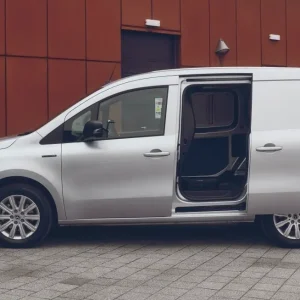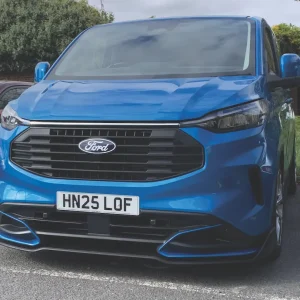UK new light commercial vehicle registrations tumbled 20.6% year-on-year to 282,139 units, according to the SMMT, as supply chain problems prevented the market from capitalising on strong demand and building on the post-pandemic growth of 2021.
Compact vans did not escape the decline with sales of minivans in the sub-2.0t sector plummeting 56% to 7,805 last year and sales of light vans weighing from 2.0 to 2.5t falling by 31% to 32,501.
The one bright spot in the market was provided by the increase in deliveries of battery electric vans (BEVs), which were up 31.2% to 16,744, which represented 6% of the total new sales market.
While other sectors are now joining the party, it was the compact van segment that pioneered electrification and at the forefront of the movement was Renault’s Kangoo ZE.
The successor to the Kangoo ZE is the Kangoo E-Tech, which arrived in the UK in the third quarter of 2022. It has moved the game on again and was an important factor in the Kangoo being crowned What Van?’s Compact Van of the Year for 2023.
The new Kangoo range overall has taken great strides in terms of quality and load-carrying ability compared to its predecessor. The E-Tech delivers power of 121hp with a 45kWh battery and a range between charges of 186 miles.
Toyota is flying the flag for car-derived vans in the compact sector and has kicked off the year by announcing it is to update the Corolla Commercial for 2023 by introducing fifth generation hybrid technology to the 1.8-litre petrol powertrain.
At the end of 2022, SFS Fire Engineering added six Corolla Commercial vans to its fleet. The hybrid vehicles are used by the fire protection company’s team of engineers when installing and maintaining equipment and replace diesel vehicles on the company’s fleet.
Citroën has introduced new trim levels and a new online reservation platform for its van range. The brand’s Berlingo and e-Berlingo compact vans are now available in Enterprise Edition and Driver Edition specs, replacing the previous Enterprise Pro and Driver Pro grades. The new online platform, is available now to reserve Berlingo and e-Berlingo vans, and will be rolled out for Citroën’s entire LCV range next year. Customers who place an online reservation will be contacted within one business hour to confirm all the details and add any part-exchange appraisal.
Customers will then have the opportunity to pick their preferred Citroën Business Centre to supply the vehicle, and a local business manager will contact them to finalise and complete the order. Customers who progress their online reservation through to a confirmed order will benefit from priority build and the option of home or office delivery.
Fellow Stellantis brand Fiat Professional opened orders for its Doblo and E-Doblo compact vans in Q3 last year. The new Doblo is available with 100hp and 130hp diesel engines, and a 110hp petrol while the E-Doblo features a 136hp electric motor and a 50kWh battery, allowing a range of up to 175 miles.
Calendar
Citroën Berlingo Enterprise Edition and Driver Edition December 2022
Citroën E-Berlingo Enterprise Edition and Driver Edition December 2022
Fiat Professional E-Doblo December 2022
Fiat Professional Doblo January 2023
Toyota Corolla Commercial update March 2023





